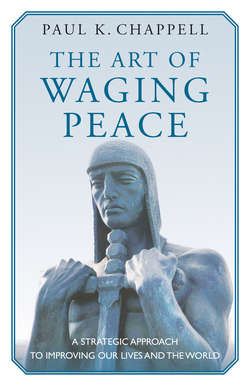Читать книгу The Art of Waging Peace - Paul K. Chappell - Страница 20
На сайте Литреса книга снята с продажи.
2. Speak to Their Potential: The Second Element of Universal Respect
ОглавлениеFor many years I viewed respect as a delicious meal, but its ingredients remained a secret. Just as a person can taste a flavorful soup and not know all of its ingredients, I had tasted respect but could not pinpoint exactly what was in it. If you had to summarize in words what makes someone respectful and another person disrespectful, how would you describe it? Is it their tone of voice, choice of words, or body language? It can be very difficult to capture the subtle differences between respect and disrespect in a few words, but then I had a deeper realization.
As I thought about all the times throughout my life when people spoke to me respectfully, they always talked to me as if deep down I was a good person, even if I was behaving badly. Martin Luther King Jr. referred to those who wanted to kill him as “our sick white brothers,” recognizing that the white racists who wanted him dead were ill with hatred, but still his brothers. When people are disrespectful they talk to us as if we lack goodness, dignity, or worth as human beings. Disrespect makes us feel worthless, while respect recognizes our enormous human potential.
Human beings have the potential to live with integrity, reason, compassion, and conscience. However, not everyone lives up to their human potential. When we talk to people in a respectful way we must “speak to their potential” by speaking to their integrity, reason, compassion, and conscience. We must strive to communicate with and stimulate those parts of their humanity. Being respectful does not mean naively pretending that every person lives with these virtues. Instead, being respectful is a way to remind people of what it means to be fully human.
When soldiers make small, careless mistakes in the army, an example of not speaking to their potential would be, “Why are you so stupid? You are such an idiot!” On the other hand, an example of speaking to their potential would be, “Why did you do that? You know better, and because I have seen how well you can perform, I expect a lot out of you. Now what are you going to do to ensure that this doesn’t happen again?” A quote attributed to the German poet Wolfgang von Goethe says, “If we treat people as they ought to be, we help them become what they are capable of becoming.”
Some people view respect as naive and impractical in the real world, but this could not be further from the truth. Martial arts philosophy teaches that respect is vital for self-defense, and Gandhi, King, and Mandela harnessed the power of respect to advance their causes in extremely difficult circumstances. Christo Brand started working at Robben Island, where Nelson Mandela was imprisoned, in 1978. Brand was an unquestioningly proapartheid eighteen-year-old white prison guard. Despite their differences in race, age, and political views, Mandela respected the young prison guard. Brand explained how this affected him: “When I came to the prison, Nelson Mandela was already 60. He was down-to-earth and courteous. He treated me with respect and my respect for him grew. After a while, even though he was a prisoner, a friendship grew.”2
Brand started doing favors for Mandela, smuggling in bread and bringing him messages. He also broke the rules in order to let Mandela hold his infant grandson.3 But as Brand explains, Mandela seemed more concerned about the well-being of the young prison guard than the favors he was receiving: “Mandela was worried that I would get caught and be punished. He wrote to my wife telling her that I must continue my studies. Even as a prisoner he was encouraging a warder to study.”4 If Mandela could have such an influential impact on his white pro-apartheid prison guard, think of the many ways respect can bridge the divides that separate us.
For those who still think respect is naive and impractical in the real world, we should remind them of an important fact. When people in a community respect each other as human beings, the bonds between them become stronger, empowering them to overcome significant challenges. At West Point every freshman has to memorize a passage from a speech Major General John M. Schofield gave there in 1879. The passage, which explains the practical value of respect, reads: “The discipline which makes the soldiers of a free country reliable in battle is not to be gained by harsh or tyrannical treatment. On the contrary, such treatment is far more likely to destroy than to make an army . . . He who feels the respect which is due to others cannot fail to inspire in them regard for himself, while he who feels, and hence manifests, disrespect toward others, especially his inferiors, cannot fail to inspire hatred against himself.”5
